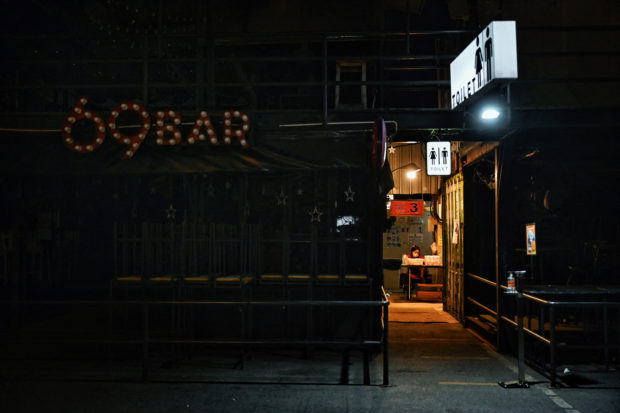Bangkok bars battle to beat booze ban battering

This photo taken on April 16, 2021 shows a restroom attendant behind shuttered bars at the Train Night Market Ratchada in Bangkok, as Thailand imposes further restrictions to deal with a spike in the number of Covid-19 coronavirus cases. AFP
BANGKOK — As gin bottles gather dust, a Bangkok bar owner is trying to keep his joint going through a Covid booze ban with fruity mocktails seasoned with kratom, a recently decriminalized tropical herb.
The Thai capital’s once-legendary nightlife has been hammered by a seven-month ban on alcohol service imposed to curb the coronavirus, leaving pub and bar owners with a major headache.
Thailand has registered around 1.7 million infections, the lion’s share since April when the government called last orders after an outbreak traced to a cluster of high-end nightclubs.
With no government support, bar owners have been left with the choice of struggling to survive, flouting the prohibition rules or getting creative.
Before the pandemic hit, bar-hopping gin lovers flocked to Teens of Thailand, a lively cocktail bar on the fringe of Bangkok’s Chinatown.
Article continues after this advertisementNow Teens has reopened at 60 percent capacity serving mocktails made with kratom, a leaf from the coffee family long used in parts of Southeast Asia as a mild stimulant.
Article continues after this advertisementKratom, which stimulates the same brain receptors as morphine but with much milder effects, came off the Thai government’s banned list in August.
The move threw Teens owner Niks Anuman-Rajadhon a lifeline, though kratom mocktails sell for just $4 compared with regular gin and tonics at $11.
“We don’t have any choice, 15-20 percent of income is enough to pay the team, pay the rent. That’s it,” Niks told AFP.
Industry collapse
Draconian travel curbs imposed to fight the coronavirus have battered the economy in Thailand, where tourism accounted for nearly 20 percent of national income pre-pandemic.
Visitor numbers have collapsed from nearly 40 million a year to a trickle, leaving the hospitality industry struggling to survive.
Thanakorn Kuptajit, the head of the Thai Alcohol Beverage Business Association, told local media he expects a 50 percent drop in the value of the $9 billion sector as a result of the ban.
Denied government support and forbidden to serve drinks in-house, bars and pubs are also banned from selling alcohol online.
As a result, some landlords in Bangkok have resorted to flouting the ban, serving booze discreetly in plain coffee mugs or soft drink cans.
But for those who have played by the rules, it has been a tough year.
In the upmarket expat hotspot of Thonglor, the co-owner of WTF Gallery Cafe, Chris Wise, says his business has been boarded up since April.
A handyman, two bar staff and an assistant have lost work or been at reduced pay.
WTF, which marked its 10th birthday earlier this year, is gearing up to reopen this week (October 21) with the launch of a new Thai art exhibition and tapas menu.
Prime Minister Prayut Chan-O-Cha gave the industry some hope last week, announcing that as part of reopening the kingdom to tourism, the government plans to lift the alcohol ban in December.
Bitter taste
But Wise warned that with customer numbers reduced and less disposable income, the road to recovery will be long.
“I can’t imagine it going back to what it was like pre-Covid,” he told AFP.
“The sanook (enjoy), mai pen rai (no worries), sa bai dee (relaxed) life that Thais have is not coming back for a long time.”
And the relaxation will be too little too late for many businesses, Teens owner Niks said.
“It’s a disaster. We have lost craftmanship, we lost industry manpower. We lost good bars, good restaurants because of mismanagement from the government,” he said, adding his best bartenders are now working in other industries.
Now as the clock ticks down to the reopening, customers at Teens sample the experimental kratom drinks menu.
One sips a mango and lime concoction served in a cup made of beeswax with honey foam — the slightly bitter tang of the kratom balanced out by the fruity sweetness.
Down the bar, Pord, 40, tries his first kratom drink, the “Tiger Ear”, which features garlic brine lime and soda.
“It tastes like a sour plum. It’s refreshing,” he told AFP.
For more news about the novel coronavirus click here.
What you need to know about Coronavirus.
For more information on COVID-19, call the DOH Hotline: (02) 86517800 local 1149/1150.
The Inquirer Foundation supports our healthcare frontliners and is still accepting cash donations to be deposited at Banco de Oro (BDO) current account #007960018860 or donate through PayMaya using this link.